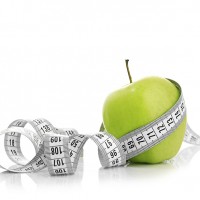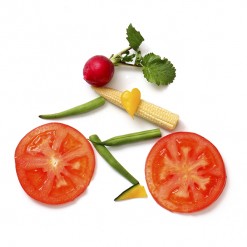

While there are no strict guidelines to what a vegetarian diet is, for the most part, it consists primarily of nuts, seeds, grains, legumes, vegetables, and fruits, and excludes meat. The total vegetarian diet excludes all animal products, including meat, fish, dairy, and eggs. Ovo-lactovegetarians eat eggs, while lactovegetarians include dairy products. There are many benefits to switching to a vegetarian diet, both from a health and physical standpoint. While a vegetarian diet isn’t for everyone, even attempting it for a week to see if you like it can go a long way in helping improve your health.
One of the biggest benefits of switching to a vegetarian diet is losing weight. While eating a salad instead of a hamburger is obviously a great way to save a lot of calories, a vegetarian diet goes past that. According to one study, a person who eats about 250 grams of meat a day (processed, poultry, or red meat) gained more weight over a five year period than those who ate less meat, even if their calorie intake was identical. A vegetarian diet tends to be much lower in total fat, which also helps lower obesity. Just because you are switching to a vegetarian diet doesn’t mean you will instantly lose weight and become healthier, however. A vegetarian can still eat cake, cookies, and chips. It is important to apply proper nutrition to all of your meals, snacks included, to help promote a healthy lifestyle.
 One of the biggest benefits of switching to a vegetarian diet is improving the health of your heart. By limiting (or completely eliminating) the amount of meat you eat, you are helping to eliminate saturated fat and cholesterol. This significantly decreases the risk of coronary heart disease. Even eating small quantities of meat increases the risk of death from cardiovascular disease. There is also a connection between meat and cancer. Women who eat processed meat and red meat have the highest risk of breast cancer, according to a study published in the British Journal of Cancer. The consumption of meat has also been linked to gastric, pancreatic, prostate, and colon cancers. By switching to a vegetarian diet, you are significantly reducing the risk of cancer. You also need to make sure you are getting enough protein and iron. Vegetarians have a much higher risk of iron deficiency than non-vegetarians, because the richest source of iron is eggs, liver, and red meat. These are all high in cholesterol, however, so eliminating them helps promote good heart health. Luckily, dried fruits, spinach, and dried beans are all excellent sources of iron. For protein, you can use soy protein, which has been shown to be equal to proteins coming from animals. You can also use protein powder and mix it into protein shakes to help get your daily intake. Always make sure you are eating a wide variety of fruits and vegetables, which are an excellent source of vitamins A and C. Lastly, if you are still consuming dairy products, try to go for non-fat, fat-free, or low-fat varieties. This will help you get the right amount of calcium but also limit your intake of saturated fats.
One of the biggest benefits of switching to a vegetarian diet is improving the health of your heart. By limiting (or completely eliminating) the amount of meat you eat, you are helping to eliminate saturated fat and cholesterol. This significantly decreases the risk of coronary heart disease. Even eating small quantities of meat increases the risk of death from cardiovascular disease. There is also a connection between meat and cancer. Women who eat processed meat and red meat have the highest risk of breast cancer, according to a study published in the British Journal of Cancer. The consumption of meat has also been linked to gastric, pancreatic, prostate, and colon cancers. By switching to a vegetarian diet, you are significantly reducing the risk of cancer. You also need to make sure you are getting enough protein and iron. Vegetarians have a much higher risk of iron deficiency than non-vegetarians, because the richest source of iron is eggs, liver, and red meat. These are all high in cholesterol, however, so eliminating them helps promote good heart health. Luckily, dried fruits, spinach, and dried beans are all excellent sources of iron. For protein, you can use soy protein, which has been shown to be equal to proteins coming from animals. You can also use protein powder and mix it into protein shakes to help get your daily intake. Always make sure you are eating a wide variety of fruits and vegetables, which are an excellent source of vitamins A and C. Lastly, if you are still consuming dairy products, try to go for non-fat, fat-free, or low-fat varieties. This will help you get the right amount of calcium but also limit your intake of saturated fats.
